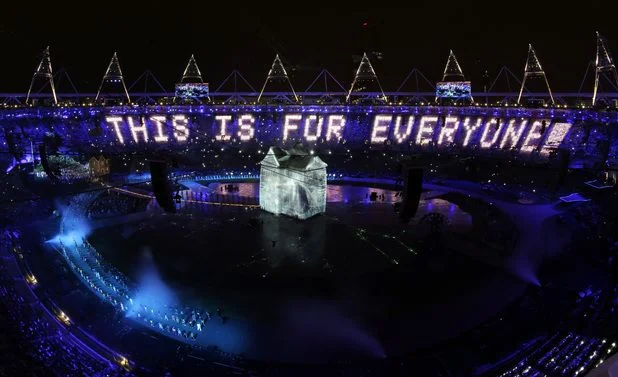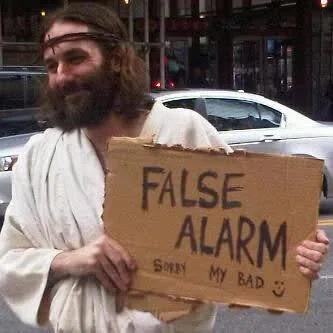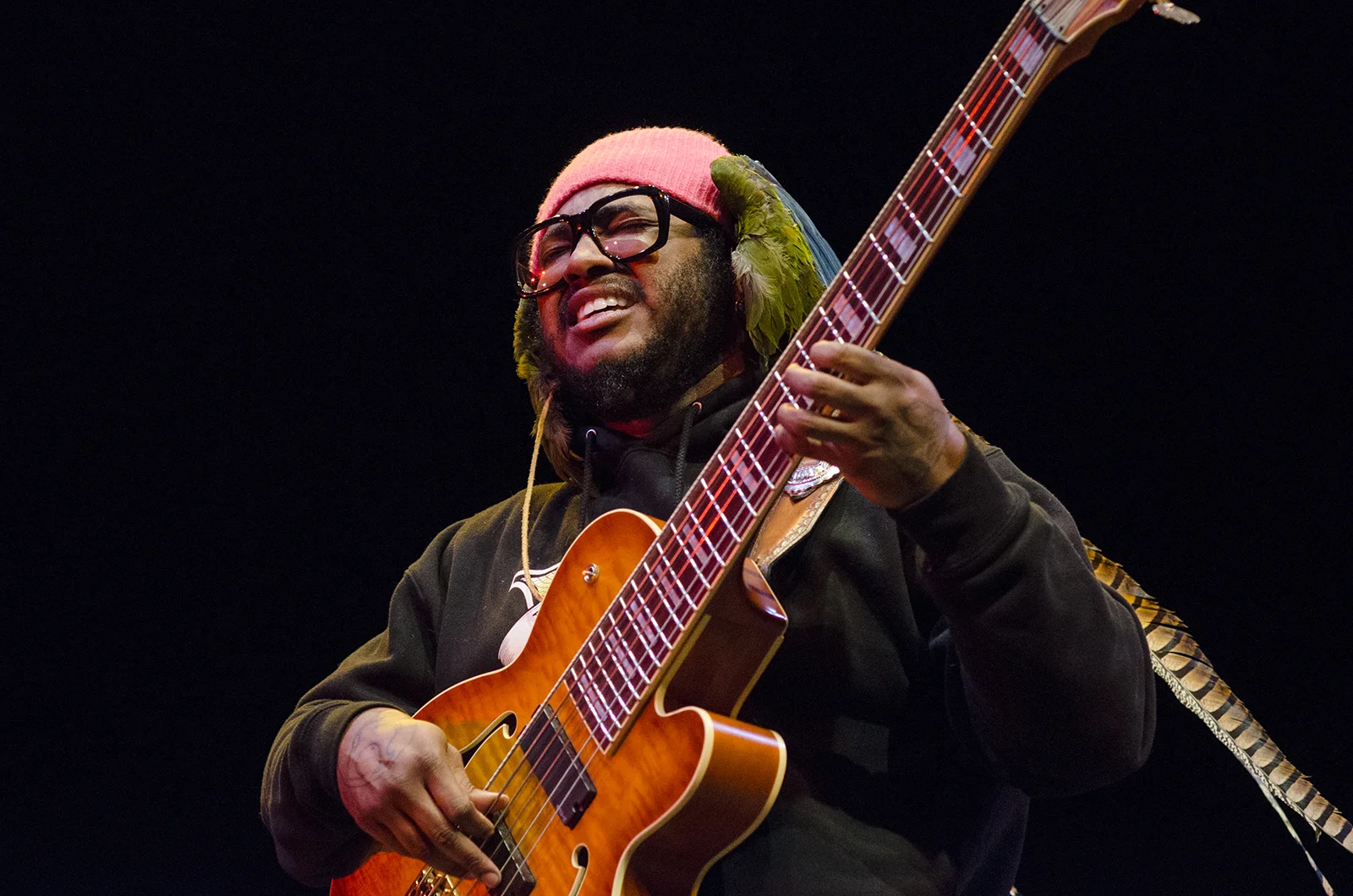By The Landlord
"I don't think we've even seen the tip of the iceberg. I think the potential of what the internet is going to do to society both good and bad is unimaginable. I think we're on the cusp of something exhilarating and terrifying." – David Bowie, in 2000.
New Year's Eve 1999. Around the world people are filled with excitement. I was filled with beer, standing with a bunch of friends on London’s Waterloo Bridge, among thousands also awaiting across several other bridges for the big countdown and the massive co-ordinated fireworks display along a long stretch of the Thames. At the climax of a display, in a frenzy of coloured smoke, I kissed my girlfriend, filled with hope of what the new millennium might bring, and at that moment, a cardboardy piece of one of the thousands of rockets fluttered above and landed lightly on my shoulder, and I put it in my pocket as a souvenir. It’s somewhere, but I haven’t found it yet.
But elsewhere in the world it was just another day. Some stayed in. Some had an early night. Some didn’t even care. But there was also a fear of the apocalypse in the air too. A fear that computers’ internal clocks would click back to zero, causing aeroplanes to fall out of the sky, and the world banking system to collapse. Some individuals even sold their homes and all their possessions, and went to the coast, waiting for the tsunami, the Rapture, the world to end.
Maybe next millennium …
But it didn’t. Well, not in that way. Many disasters have occurred, from 9/11 to the 2004 Boxing Day tsunami, and continuing conflicts around the world under many corrupt and incompetent governments. But the world didn't end. He did envision world run by lizards (not even metaphorical) but the oddball author, presenter and former goalkeeper David Icke did predict that “the years after the millennium will see gathering conflict all over the world to the point where the United Nations will be overwhelmed.” Let’s hope that doesn’t come true.
Also at that very moment on New Year's Eve, expectant mothers are awaiting their own arrivals, many planned, at least nine months earlier, hoping that their baby will be first to be born at the turn, not only of a century but of the next 1,000 years. All of this just a number of course, but, just because we have 10 fingers and toes, the decimal system somehow tends governs our minds in the marking of time.
But those children are now adults, 18 years old, and are able to vote, but where has that got them, and where has it left them? What are they like, compared to, for example, someone born 18 years earlier, or 18 years before that? Are they more confident, or more insecure? What new skills may they have, or older ones may be missing? Are they more conservative, or left wing, more politicised and informed, or less so, more curious, more adventurous, or more concerned with an internal world than an external one? What has happened to the world they were born in, and how has it changed? Do they still have the same hopes and dreams, or are those now different, post-millennium? Is the world a better or a worse place? Is it more civilised, less violent, or more passive, more conservative, more selfish, more indifferent? Might they be affected by 9/11, technology, the banking collapse of 2008, surveillance, social media and data mining? Very likely.
A few weeks ago we dipped into the world of great songwriting 1900-1955, in order the shine light on the dustier shelves before rock’n’roll. This week’s song topic is also doing the same, but in a more particular way. It’s is not about the social and political trends of the 21st century, though they may certainly feature in work nominated, but it’s an attempt to define musical trends. But are they new, or just new mixtures of older genres? What marks the last 18 years musically? Is it alt-country, alt-dance, Americana, psyche folk, freak folk, folktronica and other crossovers, crunk and crunkcore, grime, hardvapour (which developed from vapourwave) chillwave or Hypnagogic pop, cyberpunk, post-industrial techno, neurohop, neurofunk, rap rave, ragga, emo pop punk, shoegaze, post-punk pop, steampunk, or chap hop?
Straight Outta Surrey. 21st-century (tea) fusion, chap-hop style, with Mr B the Gentleman Rhymer.
And of course so many older genres have been revived and redefined, from punk and postpunk, to prog, various forms of jazz, krautrock, modern classical, not to mention key sounds from all previous decades. Technology has deeply affected the range of sounds we hear, and yet there are also regular attempts to capture older sounds.
The internet has had a major effect on music, so this week we’re looking for music that typifies and exemplifies this, from artists who have gained fame from being YouTube stars, to those whose work has solely thrived through headphones, Soundcloud, Bandcamp and other platforms.
Antony Hegarty, aka Anohni
A few years ago I got chatting to the artist Grayson Perry, who remarked that the internet is like a shoal of piranhas that hungrily eat anything up from ideas to trends. This is perhaps explains why there isn't time or private space for scenes or trends or movements to grow, such as punk in the 70s, or dance music or Britpop (or even electronic bitpop) in the 1990s. We now longer have Top of the Pops or other national music TV programmes as unify conversation points. So, like those piranhas, everything is bitesized, and then dissolved across the vast online ocean. So how does that affect the music we hear in the 21st century?
Red piranhas. Are they like the internet, gobbling up all cultural movements into small, bite-size chunks?
Another clue to musical trends also comes in the language we use. Many of these are transitory, but they may also offer something if used in lyrics, whether ironically or in earnest. So where does that leave a century that has introduced, among many others: axis of evil to alt-right, alt-left and alt-lite, not to mention alternative facts, bromance and bro code to Brexit, crowdfunding to credit crunch, Cyber Black Friday or Monday?
Selfie at a 21st-century festival. Sort of contradictory, no?
What about deep web or dark web, eggcorn to facepalm, Facebook and Instagram as nouns and verbs? Or Generation Y and generation Snowflake, the Google bomb, hacktivism, the hipster invasion or, in a mutation of all mutations – human flesh search engine? HItting your Like button to longplay gaming, mansplaining to manspreading and microadventure, Netflix to nightcore, omnishambles, pink tide to phantom vibration syndrome? Then there’s reality TV, Snowmaggeddon, superfood to space selfie (never mind the ordinary kind) to sexting to smartphone zombie. Forgot something? Then there’s throwback Thursday to Twitterati to “truthiness” (urrgh!) to transmisogyny, web 2.0 to Willkommenskultur (from the immigration crisis) to YouTube. I can't think of any Zs, other than what some of these words make me want to do.
And as usual, we have a crowdsource of Bar visitors here to tell us about the new century and what it means for music. “The role of an orchestra in the 21st century isn't just playing, it's about developing future audiences and performers,” says the American conductor and composer Leonard Slatkin. Perhaps that applies to all kinds of music, that while some is made in bedrooms on software, it has perhaps also become more collaborative, richer, mixing ever more genres, and of course, it is also requires newer forms of self-marketing. So this week does song also reflect this more personal, homespun, and collaborative approach?
FKA Twigs
“For me, electronic music is the classical music of the 21st century,” says Jean-Michel Jarre who was doing it a lot longer than that.
“Well,” says Chuck D, who continues to teach and perform, “the internet was a saving grace for promoting and exposing, and even creating. It's a parallel world to the music industry that already exists, and I'm glad to be a part of it.”
We heard from David Bowie in 2000, and this is how he explained his album at that time, and what it represents: “Heathenism is a state of mind. You can take it that I'm referring to one who does not see his world. He has no mental light. He destroys almost unwittingly. He cannot feel any Gods presence in his life. He is the 21st-century man.”
Bjork on the Biophilia tour
Meanwhile Bjork is here, still pushing the musical envelope, and maintains the same in her philosophy of music and much more: “Solar power, wind power, the way forward is to collaborate with nature - it's the only way we are going to get to the other end of the 21st century.” How does that come across in the genres of music around the last 18 years.
If there’s one theme that unifies 21st-century music it’s the growing relationship with technology, how that affects sounds, but also in method, and the theme of singularity, where humans and machines ultimately combine. Will we write the music, or will it write it for us? The writer Michio Kaku looks at this in a more extreme way. “No one knows when a robot will approach human intelligence, but I suspect it will be late in the 21st century. Will they be dangerous? Possibly. So I suggest we put a chip in their brain to shut them off if they have murderous thoughts.”
Finally it’s easy to forget how much great music there has been this century. Many readers’ tastes may have been formed in the 20th century, including mine, and much of the noughties, for example, seemed to get swallowed up in work and other matters. And yet when I look at my shelves of CDs, vinyl, and even cassettes and Mini-discs (and of course everything online), there's much I have forgotten. So here’s a quickfire list, just highlighting some of the many artists who broke through, or made a bigger mark in the last 18 years. Many are still around and thriving, many fused genres, they include many great female solo artists, and also trans ones, in roughly chronological order they include:
Badly Drawn Boy, Sigur Rós, Yo La Tengo, Godspeed You Black Emperor!, Grandaddy, Smog, Queens of the Stone Age, Eminem, Superfurry Animals, early (but definitely not later) Coldplay, OutKast , Belle & Sebastian, Doves. Elbow.
Then came The Strokes, The White Stripes, Starsailor, Missy Elliott, Jay-Z, Roots Manuva, Dizzee Rascal, Gorillaz, Basement Jaxx, Mogwai, Aphex Twin, Mercury Rev, The Beta Band, Rufus Wainwright, more work from Nick Cave, Kate Bush and PJ Harvey, the Johnny Cash late-career revival, Spiritualized, The Streets, The Flaming Lips, The Libertines, The Coral, Wilko, Cornershop, more Beck and Bjork and Blur, The Breeders and Ms Dynamite (remember her?).
Out there. The Beta Band
How about Kings of Leon, Four Tet, Yeah Yeah Yeahs, Franz Ferdinand, The Futureheads, innovative producers such as Dangermouse, TV On The Radio, Elliott Smith, The Bees, Sufjan Stevens, Joanna Newsom, Kasabian, Kanye West, Bloc Party, Maximo Park, Antony and the Johnsons, LCD Soundsystem, !!!, and Daft Punk?
And then came Arctic Monkeys, Muse, Gnarls Barkley, Amy Winehouse, Adele, Midlake, Hot Chip, Cat Power, Arcade Fire, MIA, Battles, Black Lips, Burial, Bright Eyes, Holy Fuck, Jeffrey Lewis, Justice, MGMT, Vampire Weekend, Glasvegas, Fleet Foxes, Beyoncé and in terms her persona, Lady Gaga.
Fever Ray
Or you might like some Bon Iver, Frightened Rabbit, Grizzly Bear, Wild Beasts, Fever Ray, Fuck Buttons, La Roux, Bat For Lashes, Laura Marling, Tunng, Janelle Monae, Kendrick Lamar, Lykke Li, St Vincent, Tuneyards, Anna Calvi, The Duke Spirit, Frank Ocean, Django Django, Ezra Furman, Oh Sees, alt-J, Cate Le Bon, Courtney Barnett, Parquet Courts, Savages, FKA Twigs, Sleaford Mods, Kate Tempest, Anderson Paak, Hookworms, Flat Worms, Kamasi Washington, Stormzy, or Thundercat …
Thundercat
That's quite enough from me. Over to you.
Overseeing this tremendous topic, I’m delighted to welcome, making a first guru stint at the Bar, the omniscient Nilpferd! Place your key 21st-century music in comments below in time for the deadline on Monday 11pm UK time, for playlists published next Wednesday. There’ll be something for everyone, for sure.
New to comment? It is quick and easy. You just need to login to Disqus once. All is explained in About/FAQs ...
Fancy a turn behind the pumps at The Song Bar? Care to choose a playlist from songs nominated and write something about it? Then feel free to contact The Song Bar here, or try the usual email address.











